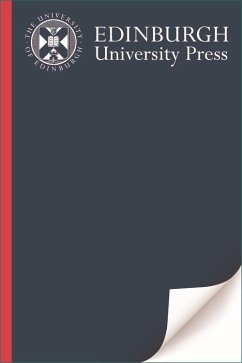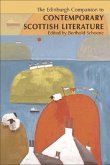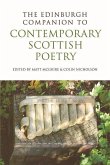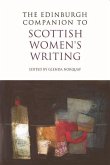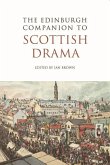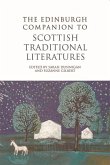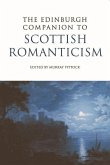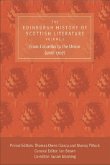Berthold Schoene (ed.)
The Edinburgh Companion to Contemporary Scottish Literature
Herausgeber: Schoene, Berthold
Berthold Schoene (ed.)
The Edinburgh Companion to Contemporary Scottish Literature
Herausgeber: Schoene, Berthold
- Broschiertes Buch
- Merkliste
- Auf die Merkliste
- Bewerten Bewerten
- Teilen
- Produkt teilen
- Produkterinnerung
- Produkterinnerung
More than forty original essays written by critics from around the world examine the cultural and political role of Scottish writing since the country's referendum on national self-rule in 1997. Essays address issues of class, sexuality, gender, nationhood, globalization, cosmopolitan citizenship, and multiculturalism, and the specific political circumstances and aesthetic agendas behind them. The collection defines a new period in Scottish literary history and heralds in a new era in the criticism of Scottish writing.
Andere Kunden interessierten sich auch für
![The Edinburgh Companion to Contemporary Scottish Literature The Edinburgh Companion to Contemporary Scottish Literature]() Berthold Schoene (edThe Edinburgh Companion to Contemporary Scottish Literature204,99 €
Berthold Schoene (edThe Edinburgh Companion to Contemporary Scottish Literature204,99 €![The Edinburgh Companion to Contemporary Scottish Poetry The Edinburgh Companion to Contemporary Scottish Poetry]() The Edinburgh Companion to Contemporary Scottish Poetry156,99 €
The Edinburgh Companion to Contemporary Scottish Poetry156,99 €![The Edinburgh Companion to Scottish Women's Writing The Edinburgh Companion to Scottish Women's Writing]() The Edinburgh Companion to Scottish Women's Writing167,99 €
The Edinburgh Companion to Scottish Women's Writing167,99 €![The Edinburgh Companion to Scottish Drama The Edinburgh Companion to Scottish Drama]() The Edinburgh Companion to Scottish Drama120,99 €
The Edinburgh Companion to Scottish Drama120,99 €![The Edinburgh Companion to Scottish Traditional Literatures The Edinburgh Companion to Scottish Traditional Literatures]() The Edinburgh Companion to Scottish Traditional Literatures118,99 €
The Edinburgh Companion to Scottish Traditional Literatures118,99 €![The Edinburgh Companion to Scottish Romanticism The Edinburgh Companion to Scottish Romanticism]() The Edinburgh Companion to Scottish Romanticism120,99 €
The Edinburgh Companion to Scottish Romanticism120,99 €![The Edinburgh History of Scottish Literature - Three-Volume Set The Edinburgh History of Scottish Literature - Three-Volume Set]() Ian Brown (ed.)The Edinburgh History of Scottish Literature - Three-Volume Set640,99 €
Ian Brown (ed.)The Edinburgh History of Scottish Literature - Three-Volume Set640,99 €-
-
-
More than forty original essays written by critics from around the world examine the cultural and political role of Scottish writing since the country's referendum on national self-rule in 1997. Essays address issues of class, sexuality, gender, nationhood, globalization, cosmopolitan citizenship, and multiculturalism, and the specific political circumstances and aesthetic agendas behind them. The collection defines a new period in Scottish literary history and heralds in a new era in the criticism of Scottish writing.
Hinweis: Dieser Artikel kann nur an eine deutsche Lieferadresse ausgeliefert werden.
Hinweis: Dieser Artikel kann nur an eine deutsche Lieferadresse ausgeliefert werden.
Produktdetails
- Produktdetails
- Verlag: Edinburgh University Press
- Seitenzahl: 432
- Erscheinungstermin: 11. April 2007
- Englisch
- Abmessung: 243mm x 172mm x 29mm
- Gewicht: 819g
- ISBN-13: 9780748623969
- ISBN-10: 0748623965
- Artikelnr.: 22535284
- Herstellerkennzeichnung
- Libri GmbH
- Europaallee 1
- 36244 Bad Hersfeld
- gpsr@libri.de
- Verlag: Edinburgh University Press
- Seitenzahl: 432
- Erscheinungstermin: 11. April 2007
- Englisch
- Abmessung: 243mm x 172mm x 29mm
- Gewicht: 819g
- ISBN-13: 9780748623969
- ISBN-10: 0748623965
- Artikelnr.: 22535284
- Herstellerkennzeichnung
- Libri GmbH
- Europaallee 1
- 36244 Bad Hersfeld
- gpsr@libri.de
Berthold Schoene is Professor of English and Director of the English Research Institute at Manchester Metropolitan University. He is the editor of The Edinburgh Companion to Contemporary Scottish Literature (EUP, 2007) and author of The Cosmopolitan Novel (EUP, 2009) and Writing Men (EUP, 2000).
CONTENTS
Introduction
PART I: Contexts
(1) Going cosmopolitan: reconstituting Scottishness in post-devolution criticism
(Berthold Schoene)
(2) Voyages of intent: literature and cultural politics in post-devolution
Scotland (Gavin Wallace)
(3) In Tom Paine's kitchen: days of rage and fire
(Suhayl Saadi)
(4) The public image: Scottish literature in the media
(Andrew Crumey)
(5) Literature, theory, politics: devolution as iteration
(Michael Gardiner)
(6) Is that a Scot or am Ah wrang?
(Zoë Strachan)
PART II: Genres
(7) The 'New Weegies': the Glasgow novel in the twenty-first century
(Alan Bissett)
(8) Devolution and drama: imagining the possible
(Adrienne Scullion)
(9) Twenty-one collections for the twenty-first century
(Christopher Whyte)
(10) Shifting boundaries: Scottish Gaelic literature after devolution
(Máire Ní Annracháin)
(11) Pedlars of their nation's past: Douglas Galbraith, James Robertson and
the new historical novel (Mariadele Boccardi)
(12) Scottish television drama and parochial representation
(Gordon Gibson and Sarah Neely)
(13) Scotland's new house: domesticity and domicile in contemporary
women's poetry (Alice Entwistle)
(14) Redevelopment fiction: architecture, town-planning, and 'unhomeliness'
(Peter Clandfield and Christian Lloyd)
(15) Concepts of corruption: crime fiction and the Scottish 'state'
(Gill Plain)
(16) A key to the future: hybridity in contemporary children's literature
(Fiona McCulloch)
(17) Gaelic prose fiction in English
(Michelle Macleod)
PART III: Authors
(18) Towards a Scottish theatrocracy: Edwin Morgan and Liz Lochhead
(Colin Nicholson)
(19) Alasdair Gray and post-millennial writing
(Stephen Bernstein)
(20) James Kelman and the deterritorialisation of power
(Aaron Kelly)
(21) Harvesting Plurality: Andrew Greig and modernism
(Simon Dentith)
(22) Radical hospitality: Christopher Whyte and cosmopolitanism
(Fiona Wilson)
(23) Iain (M.) Banks: utopia, nationalism and the posthuman
(Gavin Miller)
(24) Burying the man that was: Janice Galloway and gender
disorientation (Carole Jones)
(25) In/outside: race and citizenship in the work of Jackie Kay
(Matthew Brown)
(26) Irvine Welsh: parochialism, pornography and globalisation
(Robert Morace)
(27) Clearing space: Kathleen Jamie and ecology
(Louisa Gairn)
(28) Don Paterson and poetic autonomy
(Scott Hames)
(29) Alan Warner, post-feminism and the emasculated nation
(Berthold Schoene)
(30) A.L. Kennedy's dysphoric fictions
(David Borthwick)
PART IV: Topics
(31) Between camps: masculinity, race and nation in post-devolution Scotland
(Alice Ferrebe)
(32) Crossing the borderline: post-devolution Scottish lesbian and gay writing
(Joanne Winning)
(33) Subaltern Scotland: devolution and postcoloniality
(Stefanie Lehner)
(34) Renton's bairns: identity and language in the post-Trainspotting novel
(Kirstin Innes)
(35) Cultural devolutions: Scotland, Northern Ireland and the return of the
postmodern (Matthew McGuire)
(36) Alternative sensibilities: devolutionary comedy and Scottish camp
(Ian Brown)
(37) Against realism: contemporary Scottish literature and the supernatural
(Kirsty Macdonald)
(38) A double realm: Scottish literary translation in the twenty-first century
(John Corbett)
(39) Scots abroad: the international reception of Scottish literature
(Katherine Ashley)
(40) A very interesting place: representing Scotland in American romance
novels (Euan Hague and David Stenhouse)
(41) Cinema and the economics of representation: public funding of film in
Scotland (Duncan Petrie)
(42) Twenty-first-century storytelling: context, performance, renaissance
(Valentina Bold)
Notes on contributors
Bibliography.
Introduction
PART I: Contexts
(1) Going cosmopolitan: reconstituting Scottishness in post-devolution criticism
(Berthold Schoene)
(2) Voyages of intent: literature and cultural politics in post-devolution
Scotland (Gavin Wallace)
(3) In Tom Paine's kitchen: days of rage and fire
(Suhayl Saadi)
(4) The public image: Scottish literature in the media
(Andrew Crumey)
(5) Literature, theory, politics: devolution as iteration
(Michael Gardiner)
(6) Is that a Scot or am Ah wrang?
(Zoë Strachan)
PART II: Genres
(7) The 'New Weegies': the Glasgow novel in the twenty-first century
(Alan Bissett)
(8) Devolution and drama: imagining the possible
(Adrienne Scullion)
(9) Twenty-one collections for the twenty-first century
(Christopher Whyte)
(10) Shifting boundaries: Scottish Gaelic literature after devolution
(Máire Ní Annracháin)
(11) Pedlars of their nation's past: Douglas Galbraith, James Robertson and
the new historical novel (Mariadele Boccardi)
(12) Scottish television drama and parochial representation
(Gordon Gibson and Sarah Neely)
(13) Scotland's new house: domesticity and domicile in contemporary
women's poetry (Alice Entwistle)
(14) Redevelopment fiction: architecture, town-planning, and 'unhomeliness'
(Peter Clandfield and Christian Lloyd)
(15) Concepts of corruption: crime fiction and the Scottish 'state'
(Gill Plain)
(16) A key to the future: hybridity in contemporary children's literature
(Fiona McCulloch)
(17) Gaelic prose fiction in English
(Michelle Macleod)
PART III: Authors
(18) Towards a Scottish theatrocracy: Edwin Morgan and Liz Lochhead
(Colin Nicholson)
(19) Alasdair Gray and post-millennial writing
(Stephen Bernstein)
(20) James Kelman and the deterritorialisation of power
(Aaron Kelly)
(21) Harvesting Plurality: Andrew Greig and modernism
(Simon Dentith)
(22) Radical hospitality: Christopher Whyte and cosmopolitanism
(Fiona Wilson)
(23) Iain (M.) Banks: utopia, nationalism and the posthuman
(Gavin Miller)
(24) Burying the man that was: Janice Galloway and gender
disorientation (Carole Jones)
(25) In/outside: race and citizenship in the work of Jackie Kay
(Matthew Brown)
(26) Irvine Welsh: parochialism, pornography and globalisation
(Robert Morace)
(27) Clearing space: Kathleen Jamie and ecology
(Louisa Gairn)
(28) Don Paterson and poetic autonomy
(Scott Hames)
(29) Alan Warner, post-feminism and the emasculated nation
(Berthold Schoene)
(30) A.L. Kennedy's dysphoric fictions
(David Borthwick)
PART IV: Topics
(31) Between camps: masculinity, race and nation in post-devolution Scotland
(Alice Ferrebe)
(32) Crossing the borderline: post-devolution Scottish lesbian and gay writing
(Joanne Winning)
(33) Subaltern Scotland: devolution and postcoloniality
(Stefanie Lehner)
(34) Renton's bairns: identity and language in the post-Trainspotting novel
(Kirstin Innes)
(35) Cultural devolutions: Scotland, Northern Ireland and the return of the
postmodern (Matthew McGuire)
(36) Alternative sensibilities: devolutionary comedy and Scottish camp
(Ian Brown)
(37) Against realism: contemporary Scottish literature and the supernatural
(Kirsty Macdonald)
(38) A double realm: Scottish literary translation in the twenty-first century
(John Corbett)
(39) Scots abroad: the international reception of Scottish literature
(Katherine Ashley)
(40) A very interesting place: representing Scotland in American romance
novels (Euan Hague and David Stenhouse)
(41) Cinema and the economics of representation: public funding of film in
Scotland (Duncan Petrie)
(42) Twenty-first-century storytelling: context, performance, renaissance
(Valentina Bold)
Notes on contributors
Bibliography.
CONTENTS
Introduction
PART I: Contexts
(1) Going cosmopolitan: reconstituting Scottishness in post-devolution criticism
(Berthold Schoene)
(2) Voyages of intent: literature and cultural politics in post-devolution
Scotland (Gavin Wallace)
(3) In Tom Paine's kitchen: days of rage and fire
(Suhayl Saadi)
(4) The public image: Scottish literature in the media
(Andrew Crumey)
(5) Literature, theory, politics: devolution as iteration
(Michael Gardiner)
(6) Is that a Scot or am Ah wrang?
(Zoë Strachan)
PART II: Genres
(7) The 'New Weegies': the Glasgow novel in the twenty-first century
(Alan Bissett)
(8) Devolution and drama: imagining the possible
(Adrienne Scullion)
(9) Twenty-one collections for the twenty-first century
(Christopher Whyte)
(10) Shifting boundaries: Scottish Gaelic literature after devolution
(Máire Ní Annracháin)
(11) Pedlars of their nation's past: Douglas Galbraith, James Robertson and
the new historical novel (Mariadele Boccardi)
(12) Scottish television drama and parochial representation
(Gordon Gibson and Sarah Neely)
(13) Scotland's new house: domesticity and domicile in contemporary
women's poetry (Alice Entwistle)
(14) Redevelopment fiction: architecture, town-planning, and 'unhomeliness'
(Peter Clandfield and Christian Lloyd)
(15) Concepts of corruption: crime fiction and the Scottish 'state'
(Gill Plain)
(16) A key to the future: hybridity in contemporary children's literature
(Fiona McCulloch)
(17) Gaelic prose fiction in English
(Michelle Macleod)
PART III: Authors
(18) Towards a Scottish theatrocracy: Edwin Morgan and Liz Lochhead
(Colin Nicholson)
(19) Alasdair Gray and post-millennial writing
(Stephen Bernstein)
(20) James Kelman and the deterritorialisation of power
(Aaron Kelly)
(21) Harvesting Plurality: Andrew Greig and modernism
(Simon Dentith)
(22) Radical hospitality: Christopher Whyte and cosmopolitanism
(Fiona Wilson)
(23) Iain (M.) Banks: utopia, nationalism and the posthuman
(Gavin Miller)
(24) Burying the man that was: Janice Galloway and gender
disorientation (Carole Jones)
(25) In/outside: race and citizenship in the work of Jackie Kay
(Matthew Brown)
(26) Irvine Welsh: parochialism, pornography and globalisation
(Robert Morace)
(27) Clearing space: Kathleen Jamie and ecology
(Louisa Gairn)
(28) Don Paterson and poetic autonomy
(Scott Hames)
(29) Alan Warner, post-feminism and the emasculated nation
(Berthold Schoene)
(30) A.L. Kennedy's dysphoric fictions
(David Borthwick)
PART IV: Topics
(31) Between camps: masculinity, race and nation in post-devolution Scotland
(Alice Ferrebe)
(32) Crossing the borderline: post-devolution Scottish lesbian and gay writing
(Joanne Winning)
(33) Subaltern Scotland: devolution and postcoloniality
(Stefanie Lehner)
(34) Renton's bairns: identity and language in the post-Trainspotting novel
(Kirstin Innes)
(35) Cultural devolutions: Scotland, Northern Ireland and the return of the
postmodern (Matthew McGuire)
(36) Alternative sensibilities: devolutionary comedy and Scottish camp
(Ian Brown)
(37) Against realism: contemporary Scottish literature and the supernatural
(Kirsty Macdonald)
(38) A double realm: Scottish literary translation in the twenty-first century
(John Corbett)
(39) Scots abroad: the international reception of Scottish literature
(Katherine Ashley)
(40) A very interesting place: representing Scotland in American romance
novels (Euan Hague and David Stenhouse)
(41) Cinema and the economics of representation: public funding of film in
Scotland (Duncan Petrie)
(42) Twenty-first-century storytelling: context, performance, renaissance
(Valentina Bold)
Notes on contributors
Bibliography.
Introduction
PART I: Contexts
(1) Going cosmopolitan: reconstituting Scottishness in post-devolution criticism
(Berthold Schoene)
(2) Voyages of intent: literature and cultural politics in post-devolution
Scotland (Gavin Wallace)
(3) In Tom Paine's kitchen: days of rage and fire
(Suhayl Saadi)
(4) The public image: Scottish literature in the media
(Andrew Crumey)
(5) Literature, theory, politics: devolution as iteration
(Michael Gardiner)
(6) Is that a Scot or am Ah wrang?
(Zoë Strachan)
PART II: Genres
(7) The 'New Weegies': the Glasgow novel in the twenty-first century
(Alan Bissett)
(8) Devolution and drama: imagining the possible
(Adrienne Scullion)
(9) Twenty-one collections for the twenty-first century
(Christopher Whyte)
(10) Shifting boundaries: Scottish Gaelic literature after devolution
(Máire Ní Annracháin)
(11) Pedlars of their nation's past: Douglas Galbraith, James Robertson and
the new historical novel (Mariadele Boccardi)
(12) Scottish television drama and parochial representation
(Gordon Gibson and Sarah Neely)
(13) Scotland's new house: domesticity and domicile in contemporary
women's poetry (Alice Entwistle)
(14) Redevelopment fiction: architecture, town-planning, and 'unhomeliness'
(Peter Clandfield and Christian Lloyd)
(15) Concepts of corruption: crime fiction and the Scottish 'state'
(Gill Plain)
(16) A key to the future: hybridity in contemporary children's literature
(Fiona McCulloch)
(17) Gaelic prose fiction in English
(Michelle Macleod)
PART III: Authors
(18) Towards a Scottish theatrocracy: Edwin Morgan and Liz Lochhead
(Colin Nicholson)
(19) Alasdair Gray and post-millennial writing
(Stephen Bernstein)
(20) James Kelman and the deterritorialisation of power
(Aaron Kelly)
(21) Harvesting Plurality: Andrew Greig and modernism
(Simon Dentith)
(22) Radical hospitality: Christopher Whyte and cosmopolitanism
(Fiona Wilson)
(23) Iain (M.) Banks: utopia, nationalism and the posthuman
(Gavin Miller)
(24) Burying the man that was: Janice Galloway and gender
disorientation (Carole Jones)
(25) In/outside: race and citizenship in the work of Jackie Kay
(Matthew Brown)
(26) Irvine Welsh: parochialism, pornography and globalisation
(Robert Morace)
(27) Clearing space: Kathleen Jamie and ecology
(Louisa Gairn)
(28) Don Paterson and poetic autonomy
(Scott Hames)
(29) Alan Warner, post-feminism and the emasculated nation
(Berthold Schoene)
(30) A.L. Kennedy's dysphoric fictions
(David Borthwick)
PART IV: Topics
(31) Between camps: masculinity, race and nation in post-devolution Scotland
(Alice Ferrebe)
(32) Crossing the borderline: post-devolution Scottish lesbian and gay writing
(Joanne Winning)
(33) Subaltern Scotland: devolution and postcoloniality
(Stefanie Lehner)
(34) Renton's bairns: identity and language in the post-Trainspotting novel
(Kirstin Innes)
(35) Cultural devolutions: Scotland, Northern Ireland and the return of the
postmodern (Matthew McGuire)
(36) Alternative sensibilities: devolutionary comedy and Scottish camp
(Ian Brown)
(37) Against realism: contemporary Scottish literature and the supernatural
(Kirsty Macdonald)
(38) A double realm: Scottish literary translation in the twenty-first century
(John Corbett)
(39) Scots abroad: the international reception of Scottish literature
(Katherine Ashley)
(40) A very interesting place: representing Scotland in American romance
novels (Euan Hague and David Stenhouse)
(41) Cinema and the economics of representation: public funding of film in
Scotland (Duncan Petrie)
(42) Twenty-first-century storytelling: context, performance, renaissance
(Valentina Bold)
Notes on contributors
Bibliography.

